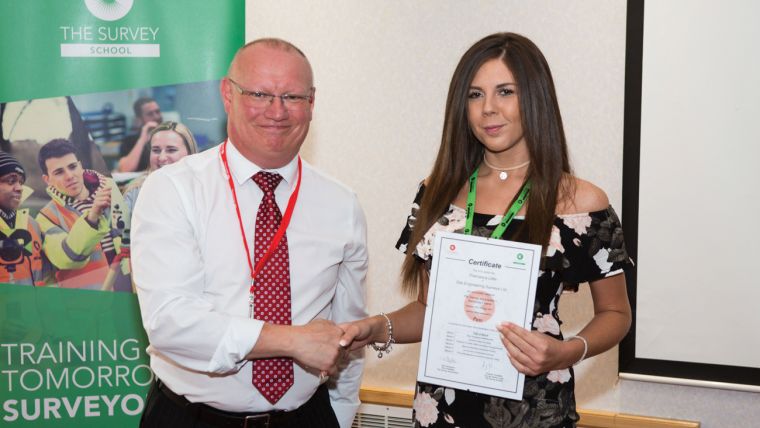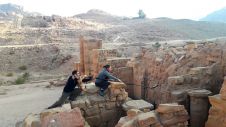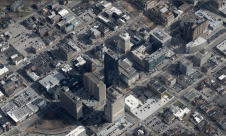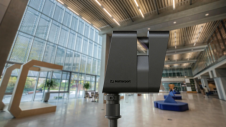From Hairdresser to Surveyor - Interview with Francesca Little
How The Survey School Prepares Students for Challenging Jobs
This article was originally published in Geomatics World.
Since 2001, more than 400 students have successfully completed the TSA Surveying Course at The Survey School in Worcester. The syllabus, which was written by The Survey Association, gives students a thorough grounding in both the practical and theoretical elements of land surveying. Francesca Little graduated from The Survey School in July 2017. At just 23 years old, she has the drive and ability needed to take her to the very top of the profession. With promotion to senior surveyor now in sight, she explains why she thrives on extra responsibility and new challenges.
The Survey Association: How did your career in surveying begin?
Francesca Little: I didn’t do that well at school but just before GCSEs, I moved to a different school, got my head down and worked hard. I didn’t know what I wanted to do so, like many of my friends, I applied for a course in hairdressing at my local college. I’m a hands-on person and I learn best by doing something practical.
After some work experience at a firm of architects, I had a change of heart about hairdressing. I wasn’t sure if I wanted to be an architect, but the design of buildings really interested me, and I knew that I wanted something more for myself than hairdressing. The college put me on the Level 3 BTech course in Construction and the Built Environment, where I was the only girl in a class of 15 students. The course included a good insight into all the job roles in construction, but it was surveying that really grabbed me.
After college I had to be very single-minded about finding the sort of job I’d trained for. I was unemployed, and the Job Centre only offered me office or retail work. It was hard to keep my goal in mind because I needed the money.
Everything changed when I joined SES as assistant surveyor. I was given a lot of opportunities to learn and gain the experience I needed to be promoted. I was keen to take on extra responsibility and soon got made up to graduate assistant, then junior and now surveyor.
TSA: In a typical week, what sort of work are you doing?
FL: I could be on site, setting out, establishing grid control or talking to clients. No two days are the same and the job can sometimes throw up a few surprises, such as the time that we discovered that all our control points had to be re-established as they had been waterproofed over!
After some competitive tests, I was one of only two members of staff selected by SES for a place on the TSA Surveying Course at The Survey School in Worcester. Studying and practising the principles of surveying through each block on the Course has given me a better understanding of the instruments and the skills needed to question and investigate readings.
TSA: What kind of projects have you worked on?
FL: I assisted the project surveyor on a £500m project for the London HQ of a global bank soon after joining SES. There were five teams of surveyors and I was based there for six months. We had to establish control points and datum levels on each floor of the building. Every day was different and dealing with the challenges of the project kept me interested and keen to learn. I stayed there until the handover to the fit-out company. From there I went to the work on the new European HQ for a multi-national online retailer, another prestigious commercial and residential development in London.
TSA: What part of your job do you most enjoy?
FL: I love working independently, planning the work and speaking to clients. The more responsibility and the more pressure, the better I like it. I find the problem-solving that comes with the job stimulating. For example, we had to do a lift shaft survey in a basement. There were no control points and we had to find a place to set up. Working in awkward spaces and overcoming those challenges is one aspect of the job that I particularly enjoy.
TSA: What advice would you give your younger self on whether to choose a career in surveying?
FL: Sometimes I can’t quite believe that I’ve worked on such huge projects, how I’ve planned and overseen the jobs and dealt with the responsibility. As a woman, it was a little daunting at first, but I’ve never had any trouble on site. The self-belief that comes with experience has earned me respect. Some very experienced people have questioned my results, then after checking they told me they were wrong, and I was right! So perhaps I should have had more confidence in myself at an earlier age because I had the ambition and self-motivation to succeed.
Now I’ve found the right career for me, I don’t intend to stand still. The opportunities in surveying are endless. I hope to continue progressing as much as I can and maybe in the next ten years I could be working in a management position, either within the company I’m in now or elsewhere, either UK-based or overseas. Setting up my own survey company is something I would also consider. I’m excited by the opportunities that could come my way and where a career in surveying will take me.
This article was published in Geomatics World May/June 2018
--------------------
The Survey School
In May 2014, The Survey Association (TSA) took over the running of the Survey School in Worcester. The TSA Surveying Course, written by TSA in 2001 to address the chronic shortage of survey training in the UK, continues to go from strength to strength. They are the UK’s only commercial training centre that provides training to the land survey industry which is accredited by The Chartered Institution of Civil Engineering Surveyors.
The Survey School was established in Worcester over 30 years ago and TSA took over the running of the school to ensure the continuation of arguably the best survey training available in the UK. Since taking over, TSA has invested in updating the IT systems and equipment and has received immense support from the survey instrument manufacturers.
In the late 1990s, it was evident that there was a need for non-academic practical survey training and so the TSA Surveying Course was developed which has strong links with the surveying industry both in terms of potential employers and equipment manufacturers. The Course takes place in two six-week blocks spread over two years.
TSA is committed to training the next generation of surveyors and is expanding the number of short courses available at the school. TSA has also offered a Student Bursary to students in their second year at Newcastle University since 2011.

Value staying current with geomatics?
Stay on the map with our expertly curated newsletters.
We provide educational insights, industry updates, and inspiring stories to help you learn, grow, and reach your full potential in your field. Don't miss out - subscribe today and ensure you're always informed, educated, and inspired.
Choose your newsletter(s)
























